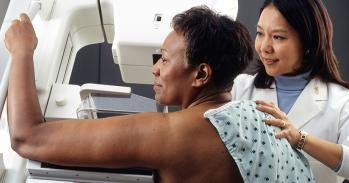
Cancer Research UK has announced £9.2m for Cambridge to train the next generation of doctors and scientists to bring new and better cancer treatments to patients faster.
Cancer Research UK has announced £9.2m for Cambridge to train the next generation of doctors and scientists to bring new and better cancer treatments to patients faster.
I’m immensely grateful for the funding I received from Cancer Research UK, which provided me with a key stepping stone in my clinician scientist career
Caroline Watson
The charity is to award the funding over the next five years to train early-career clinician scientists – doctors who also carry out medical research - as part of its Clinical Academic Training Programme.
The Clinical Academic Training Programme will invest £58.7m at nine research centres including the Cancer Research UK Cambridge Centre in partnership with the University of Cambridge and Cambridge University Hospitals NHS Foundation Trust, which includes Addenbrooke’s Hospital.
Clinician scientists play an essential role in translating cancer research, helping to bridge the gap between scientific research carried out in laboratories and clinical research involving patients.
Dr Caroline Watson – now a Group Leader in the Early Cancer Institute at the University of Cambridge and Honorary Haematology Consultant at Addenbrooke’s Hospital – has benefited from this funding, having previously been awarded a three-year Cancer Research UK Clinical Research Training Fellowship in 2017. Caroline was first author on a Science paper and Nature Genetics paper, based on her Cancer Research UK-funded research, that identified which mutations in healthy blood are associated with the highest risk of developing blood cancer.
Dr Watson said: “As we age, we all acquire mutations in the cells that make up our tissues. The vast majority are harmless, but some can increase cancer risk. With blood’s relative ease of sampling and improved DNA sequencing costs, we now have enough data, across many thousands of individuals, to determine which specific mutations enable cells to expand most rapidly and could therefore confer the highest risk of cancer. Knowing whether specific mutations are high-risk or clinically insignificant is key for the future of personalised cancer risk.
“I’m immensely grateful for the funding I received from Cancer Research UK, which provided me with a key stepping stone in my clinician scientist career. I feel fortunate to now be able to spend the bulk of my time focused on research, but also continue with some clinical work in parallel. Having been involved in setting up the UK’s first clinic focused on blood cancer prevention at Addenbrooke’s Hospital, I look forward to translating my research findings to directly benefit patients.”
Michelle Mitchell, Cancer Research UK’s Chief Executive, said: “Clinician scientists have a very important role to play by bringing their knowledge and experience of treating people with cancer to scientific research.
“We need all our doctors and scientists to be able to reach their full potential, no matter their background. That’s why we are continuing to provide flexible training options for early-career clinician scientists.”
The contribution of clinician scientists in the new Cambridge Cancer Research Hospital will be critical for the future of cancer research. The East of England specialist cancer hospital planned for the Cambridge Biomedical Campus is bringing together clinical expertise from leading Addenbrooke’s Hospital with world-leading scientists from the University of Cambridge and Cancer Research UK Cambridge Centre, under one roof.
This integrated approach will help fast-track cancer innovations and will mean patients across the region can directly benefit from the latest innovations in cancer science.
Becoming a clinician scientist usually involves doctors taking time out of their medical training to undertake a PhD, before returning to train in their chosen specialisation, but many clinicians don’t come back to research after qualifying as consultants. This may be due to existing pressure on the healthcare system and lack of available funding.
Nearly three quarters (74%) of clinical research staff surveyed by Cancer Research UK in 2023 said that it has become harder to deliver research in a timely manner in the last 18 months, with 78% of respondents describing wider pressures on the health service as a substantial or extreme barrier.
To tackle this issue, Cancer Research UK’s Clinical Academic Training Programme provides flexible training options alongside mentorship and networking opportunities to better support clinicians who want to get involved and stay in cancer research.
Data from the Medical Schools Council Clinical Academic Survey reports a decline in the number of clinical academic positions between 2011–2020. Research from the United States also suggests that offering combined qualifications retains more women in clinical research roles.
Professor Richard Gilbertson, Head of the Department of Oncology at the University of Cambridge and Director of the Cancer Research UK Cambridge Centre, said: “We are delighted to gain further generous support from Cancer Research UK to enable us to provide doctors and medical students with flexible training opportunities, training them to be the clinical cancer research leaders of the future.
“Developing new and effective treatments of cancer requires teams of scientists working in the clinic and laboratory, in all specialities. This funding is crucial to ensure that we train these individuals so that we can make these discoveries to benefit patients with cancer well into the future.”
Adapted from a press release from Cancer Research UK

The text in this work is licensed under a Creative Commons Attribution-NonCommercial-ShareAlike 4.0 International License. Images, including our videos, are Copyright ©University of Cambridge and licensors/contributors as identified. All rights reserved. We make our image and video content available in a number of ways – on our main website under its Terms and conditions, and on a range of channels including social media that permit your use and sharing of our content under their respective Terms.




